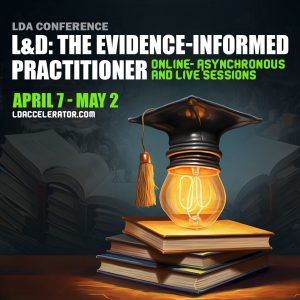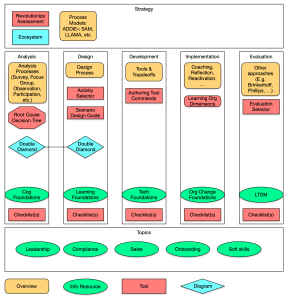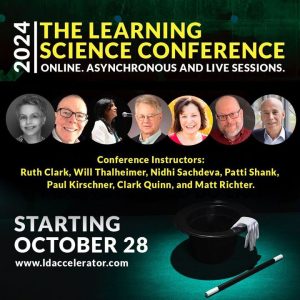As I’m wont to do, I was thinking in the middle of the night. About creativity, in this case. Specifically, that I have repeatedly demonstrated the ability to integrate creativity and learning science. And, I tend to forget about it. (Which means you may, too!) Of course, I push the rigor of the cognitive and learning sciences, and advocate for the integration of emotion. However, it’s been decades since I’ve really emphasized my portfolio of work on games and engagement. Maybe since my first book on engagement? So, maybe it’s time to talk about creativity and rigor.
To be clear, I believe it’s important to get both learning and engagement right. Sure, pure computer games are fun (heck, I play them!). And, many have stories that are actually relevant, too. But serious games, ones that actually achieve an outcome, require integrating learning science with engagement. Which isn’t necessarily easy! But, it’s something I’ve reliably done, and I don’t want to forget it!

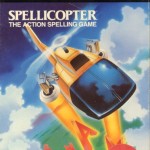
 So, fresh out of college, my first real job was designing and programming educational computer games. (This was for Jim Schuyler at DesignWare.) I created Micro Discovery, a set of games based upon the Computer Discovery series but with my own little set. I then went on to FaceMaker for Spinnaker, before coding Spellicopter and Creature Creator for ourselves. (All before I headed off to grad school.) They weren’t great, as we only had 48K and were targeting the home market, but they were notable. Both FaceMaker and Creature Creator had graphic designers who assisted my lack of visual design capability!
So, fresh out of college, my first real job was designing and programming educational computer games. (This was for Jim Schuyler at DesignWare.) I created Micro Discovery, a set of games based upon the Computer Discovery series but with my own little set. I then went on to FaceMaker for Spinnaker, before coding Spellicopter and Creature Creator for ourselves. (All before I headed off to grad school.) They weren’t great, as we only had 48K and were targeting the home market, but they were notable. Both FaceMaker and Creature Creator had graphic designers who assisted my lack of visual design capability!
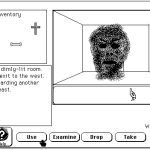 From my graduate work on analogical reasoning, during my post-doc I built a game that required using the stories to solve problems, with a coherent theme. I even published a paper about Voodoo Adventure! This was all on my own, and the graphics weren’t great, but they were ‘good enough’. Hey, two kids at an open house played it all the way through and won (many others tried it out and gave up, to be fair).
From my graduate work on analogical reasoning, during my post-doc I built a game that required using the stories to solve problems, with a coherent theme. I even published a paper about Voodoo Adventure! This was all on my own, and the graphics weren’t great, but they were ‘good enough’. Hey, two kids at an open house played it all the way through and won (many others tried it out and gave up, to be fair).
At my first teaching position post-grad, I was asked to build a game that helps kids survive on the streets. Quest achieved many things: it achieved the goal of engaging the audience and driving them to important conversations with their counselors; it made it onto the local science program; it sparked a journal article that’s led to my subsequent books, Engaging Learning and then Make It Meaningful; and it’s still arguably the most rewarding professional thing I’ve ever done. It was assisted first by a  talented student in programming, and then by graphic talents who addressed the look and feel.
talented student in programming, and then by graphic talents who addressed the look and feel.

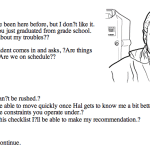
 I went on to build first a linear scenario and then a full game on project management (for non-project managers) for a major government organization. This was in conjunction with a team of graphic artists and a software engineer (a bit of that story is also here). I also led design of scenarios for psychiatric nursing. Then I went on and designed a demo game to go with textbooks.
I went on to build first a linear scenario and then a full game on project management (for non-project managers) for a major government organization. This was in conjunction with a team of graphic artists and a software engineer (a bit of that story is also here). I also led design of scenarios for psychiatric nursing. Then I went on and designed a demo game to go with textbooks.
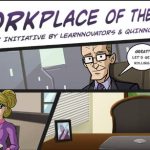 Ok, so I also designed a course that used comics to start off each section, ran a web competition for school kids, did a compelling demo of how to do a good course on the cheap with Learnovators, created mobile games for a NASA test, and…have designed workshops on game design and more. I’m sure there’s more, but that’s off the top of my head. I have regularly combined creativity and rigor, it’s just hard to remember sometimes. And, if you can think of a useful way for me to continue, I welcome hearing!
Ok, so I also designed a course that used comics to start off each section, ran a web competition for school kids, did a compelling demo of how to do a good course on the cheap with Learnovators, created mobile games for a NASA test, and…have designed workshops on game design and more. I’m sure there’s more, but that’s off the top of my head. I have regularly combined creativity and rigor, it’s just hard to remember sometimes. And, if you can think of a useful way for me to continue, I welcome hearing!
